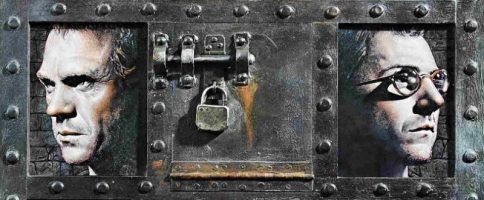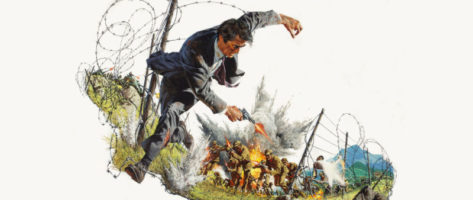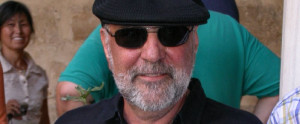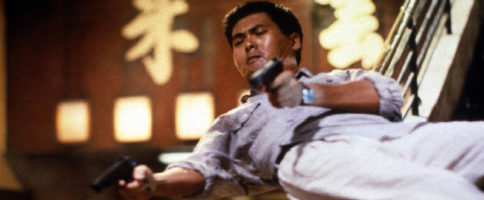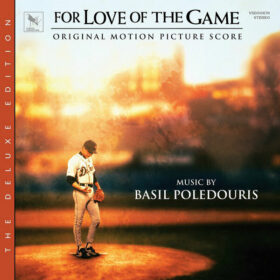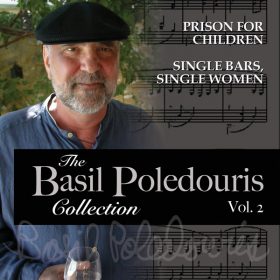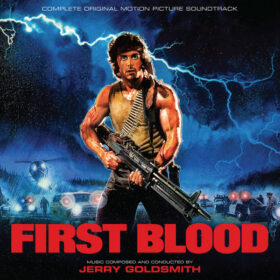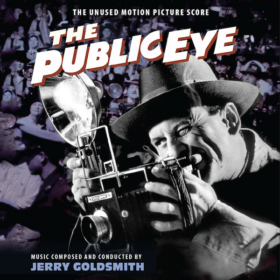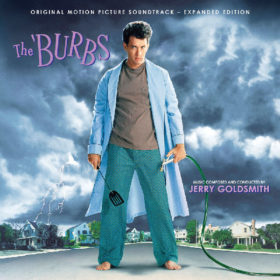You worked on both very big action movies, and very intimate dramas, but your music always seems to focus on the emotion of the characters.
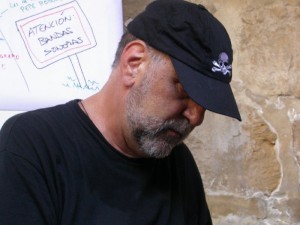 There’s nothing terribly sophisticated in my music, there never has been, it’s almost folk song, in a way, a very simple construction. Both John Milius and Paul Verhoeven just wanted a subtext, but they also wanted emotion. And Paul did tell me «When I use Jerry Goldsmith, I use him for the intellectual first, and when I use you, I want you to put emotion first». So, I don’t have to be too sophisticated (laughing). I think that’s where it starts from. Emotion is the very first thing I do, but it depends on the film. The form dictates the writing. A movie like The Blue Lagoon has nothing to do with Conan The Barbarian. I think if you want to be true to the characters, you have to find out who they are and what they are. Like I said when we talked about Conan, he was a brute, the strongest man in the world, a killing machine. These kids on an island, it’s a whole different story. There’s a sweetness, an innocence, the discovery of their sexuality, the discovery of life around them, the horrors of the cannibals…
There’s nothing terribly sophisticated in my music, there never has been, it’s almost folk song, in a way, a very simple construction. Both John Milius and Paul Verhoeven just wanted a subtext, but they also wanted emotion. And Paul did tell me «When I use Jerry Goldsmith, I use him for the intellectual first, and when I use you, I want you to put emotion first». So, I don’t have to be too sophisticated (laughing). I think that’s where it starts from. Emotion is the very first thing I do, but it depends on the film. The form dictates the writing. A movie like The Blue Lagoon has nothing to do with Conan The Barbarian. I think if you want to be true to the characters, you have to find out who they are and what they are. Like I said when we talked about Conan, he was a brute, the strongest man in the world, a killing machine. These kids on an island, it’s a whole different story. There’s a sweetness, an innocence, the discovery of their sexuality, the discovery of life around them, the horrors of the cannibals…
The very first thing I usually do is that I look at the film, even if it’s a rough cut and, not memorize it, but to get an idea. It’s hard to do from the script sometimes, 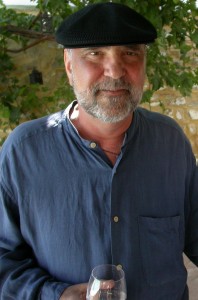 because the movie has a different language from the script, hopefully, and certainly from the novel. It should be. Then I turn off the movie, and I sit to the piano, very much like writers when they go to typewriters, or used to. It brings on the writing. I just sit down, put the tape recorder on, and just free associate. Jack Kerouac used to say «First idea is best idea». The unedited idea. The non-censored idea. There’s freedom to it, and I think there’s truth in it as well. And out of that, maybe there’s a few motives, maybe there’s an orchestration idea. I can play on the piano and it would represent woodwinds, it’s not just piano for me. It will represent things. Little things, timpanis, tuba… So it could be an orchestration idea, a motive, a melody, rythms. Rythms could be a motif (he sings the Jaws theme). Do you imagine playing that on the piano for Steven Spielberg ? «What the hell is this ?» But it takes the confidence of the director to let the composer do that. Now, with another director, it can be «Oh no, it’s terrible». And that’s it. That’s the end of it.
because the movie has a different language from the script, hopefully, and certainly from the novel. It should be. Then I turn off the movie, and I sit to the piano, very much like writers when they go to typewriters, or used to. It brings on the writing. I just sit down, put the tape recorder on, and just free associate. Jack Kerouac used to say «First idea is best idea». The unedited idea. The non-censored idea. There’s freedom to it, and I think there’s truth in it as well. And out of that, maybe there’s a few motives, maybe there’s an orchestration idea. I can play on the piano and it would represent woodwinds, it’s not just piano for me. It will represent things. Little things, timpanis, tuba… So it could be an orchestration idea, a motive, a melody, rythms. Rythms could be a motif (he sings the Jaws theme). Do you imagine playing that on the piano for Steven Spielberg ? «What the hell is this ?» But it takes the confidence of the director to let the composer do that. Now, with another director, it can be «Oh no, it’s terrible». And that’s it. That’s the end of it.
The characters have to come from the writing. It’s the prime creation, wether it’s the script, the book and that’s it. And the director’s vision interpreting that writing. It’s very important for a composer to have the room, to have the freedom, to explore these things. I tried to do that with Kevin Costner, on his last film. Open Range. I was set to do it. Then Disney called, and they needed a temp track for the movie. And you know what they temp-tracked it with ? Starship Troopers ! Honest to god ! And I heard it and said «This is not what we talked about. I can’t do this». And I got out of the movie. This is not a space opera ! This is very classic western. Absolutely. Very intimate, in the mud, in the rain… Unfortunately, it was the end of Kevin and I relationshionship.
Weren’t you supposed to score Dances With Wolves ?
Yes. Because Kevin loved Lonesome Dove. But I was set to do a movie for John Milius, Flight Of The Intruder. It was a difficult choice, very difficult, because I was already commited to John Milius… But I got to do For Love Of The Game with Kevin, so we did work together. And John Barry did a beautiful job. I went to the Academy awards that night, and Mike Medavoy looked at me and said «It could have been you» ! He was right !
You didn’t score John Milius’ Rough Riders…
Rough Riders… Elmer did that, didn’t he ? I didn’t want to do it. I was involded on another movie at the time. Maybe Starship Troopers. In the same way, I just had to turn down Simon Wincer’s Comanche Moon, from Larry McMurtry’s book. And Simon just finished shooting a 6 hours miniseries, Into The West. And unfortunately I was unable to be involved, for health reasons. Hopefully my young friend Eric Colvin will be doing this. He’s a wonderful composer, a wonderful writer, a complete musician.
Do you have any upcoming projects ?
I have the Simon Wincer’s film. I moved to an island recently, off Seattle. I moved my studio up there. I’m in the process of just writing music for myself. I wanted to take a break, just after my divorce. That carved a big hole in your life. Right now, I’m just writing music for myself. I haven’t conducted an orchestra live since The Touch, a film I did in China, about 3 years ago. But a live performance, 5 years, 6 years…
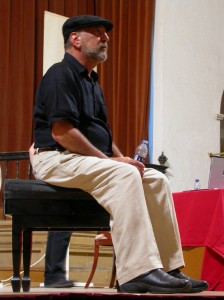 When I studied music at the university, it was a bad word, film music. They didn’t want to know about it, «This is not music». And in a sense it’s right, it’s not Mozart. But things are changing. I think they’re beginning to recognize that. Also they may become to get bored with Mozart. I love it, but I don’t wanna go to a concert with the music of Mozart again. I wanna hear Philip Glass, something I haven’t heard yet. But something that’s accessible, not too heavy. And I think film music’s very accessible, very popular, and a sort of bridge between the classic world, the concert music, and pop music. I think it has a niche, that it’s viable, and that people respond to it, because it does recall the movies. I think movies are the script, the translation of our time. What is infortunate is that everybody’s doing sequels and remake of television shows … My god, how many Mission : Impossible are we gonna have ? Who wants to see Tom Cruise that much ?
When I studied music at the university, it was a bad word, film music. They didn’t want to know about it, «This is not music». And in a sense it’s right, it’s not Mozart. But things are changing. I think they’re beginning to recognize that. Also they may become to get bored with Mozart. I love it, but I don’t wanna go to a concert with the music of Mozart again. I wanna hear Philip Glass, something I haven’t heard yet. But something that’s accessible, not too heavy. And I think film music’s very accessible, very popular, and a sort of bridge between the classic world, the concert music, and pop music. I think it has a niche, that it’s viable, and that people respond to it, because it does recall the movies. I think movies are the script, the translation of our time. What is infortunate is that everybody’s doing sequels and remake of television shows … My god, how many Mission : Impossible are we gonna have ? Who wants to see Tom Cruise that much ?
And then, when you’re writing that stuff, there is so many times you go «Who is ever gonna listen to this ?». And on some movies, you cannot hear anything, it’s all buried underneath sound effects. «Why am I doing this ?». But when you work with a director, especially a director you have a close relationship with, like John Milius, Paul Verhoeven, Randall Kleiser, Simon Wincer… you’re scoring their minds. And they might wanna think that because they can do Showgirls and Flesh+Blood and Robocop that they can do really different things… But for a composer, it’s like the relation between Tim Burton and Danny Elfman, the relationship between John Williams and Steven Spielberg, and George Lucas. John Ottman and Bryan Singer. Fellini and Rota. Because the composers and the directors understand each other. They speak their own languages at a shorthand. That’s critical, for a composer and a director. A good relationship is important for the film. We score their brains.
One of your favorite themes seems to be the sea. Are you particularly inspired by it ?
Oh yeah ! First of all, I grew up in a place called Naples, near Long Beach, California. I started to sail when I was 6. I got my first boat when I was 9 years old. So that’s always been a major part of my life. And then I started surfing when I was 12 years old. And I kept getting more and more, going further and further out in the ocean. There’s an island off California called Catalina, I would go there all the time. I still do. I still sail. So it’s always been my escape. Some people use drugs, alcohol, sex, work… For me it’s the sea.
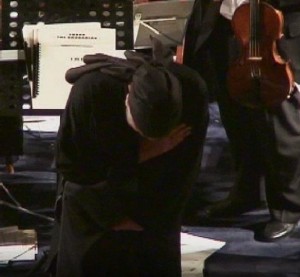 When Wind came along, I wanted so much to do the movie, because the America’s Cup has always been extraordinary interesting to me, and the men behind it. Back to the Lipton tea era ! So I went to the production’s offices in Berkley, California, and I just followed them around until I get the job !
When Wind came along, I wanted so much to do the movie, because the America’s Cup has always been extraordinary interesting to me, and the men behind it. Back to the Lipton tea era ! So I went to the production’s offices in Berkley, California, and I just followed them around until I get the job !
Milius and I were surfers, and when we did Big Wednesday, we went to Hawaii, and John made us all ride these big waves. We thought we’d all gonna die ! That kind of thing….the beginning of Conan, Nietzsche, «That wich does not kill us make us stronger». That was kinda John’s moto.
Yes, sea has been very important. The other thing that’s been important in my life, wich I started at 7 years old, is the piano. I love to play, I can play for hours. But when I need silence, I go to the sea .I think somewhat that they’re related, because you have to be aware without being self-conscious, to do both, to write music and to sail. You need to know the flow. And there’s a slow, and a rise, and a fall… It’s always changing. The material is grey, blue, bright, dark, strong, calm, always changing…
As an homage to Basil Poledouris (1945-2006)
Interview conducted on 22 july 2006 in Ubeda by Olivier Desbrosses & Stéphanie Personne.
Transcription & translation : Olivier Desbrosses.
Pictures : Olivier Desbrosses.
Thanks to the whole Ubeda Festival team for making this interview possible, and to Basil Poledouris for his kindness and availability.





